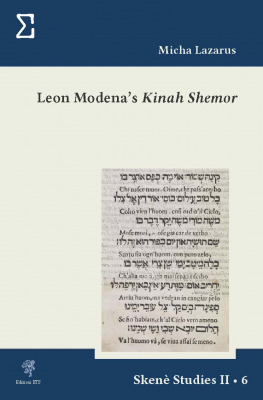Micha’s work has appeared widely in journals such as Renaissance Quarterly, Renaissance Studies, Review of English Studies, Classical Receptions Journal, Journal of the Warburg and Courtauld Institutes, and Huntington Library Quarterly, as well as numerous edited collections.
His first book, Leon Modena's Kinah shemor (Pisa, 2023) is about an extraordinary poem that makes sense in Hebrew and Italian simultaneously, written by the prodigy Leon Modena at the age of just 13. It has been reviewed in Renaissance Quarterly.
His second book, Alexander Nowell’s Rough Book: The Life and Library of a Reformation Humanist (forthcoming, The Bibliographical Society) unpacks, from a haphazard sheaf of dog-eared papers in the Bodleian Library, a social and economic microhistory of daily life in Oxford and Westminster in the 1530s and '40s.
Micha is General Editor of Sources in Early Poetics, a book series at Brill, and convenor of Poetics before Modernity, an international project on the history of criticism with Vladimir Brljak. The first publication to issue from the project is Artes poeticae: Formations and Transformations, 1500-1700, special issue of Classical Receptions Journal 13.1 (2021). He is also one of the principal editors of Literary Criticism of the English Renaissance, a major new multi-volume anthology forthcoming from Oxford University Press.
Micha is currently working on several book projects.
- Aristotle’s Poetics in Renaissance England
-
Monograph in preparation for Oxford University Press. Aristotle’s Poetics in Renaissance England establishes the English influence of this foundational work of literary criticism several decades earlier than has previously been thought, tracing almost one hundred and fifty copies of the work to sixteenth-century English owners and pursuing its literary influence on figures such as John Cheke, Roger Ascham, Philip Sidney, Samuel Daniel, Shakespeare, and Milton.
For an introduction to Micha’s work in this field, see ‘Aristotelian Criticism in Sixteenth-Century England’, in Oxford Handbooks Online (Oxford University Press, 2016).
- Reformation Literary Criticism
-
Anthology in preparation for Brill. Reformation Literary Criticism is an anthology of texts in facing-page translation, representing a school of literary thought that coalesced in the 1530s and 1540s around Philip Melanchthon and his circle at Wittenberg, the heart of the Reformation. Long neglected, this influential body of criticism is here made available for the first time, filling in the gap between ‘medieval’ and ‘Renaissance’ literary criticism and pressing on the edges of the story of classical reception.
For an introduction to Micha’s work in this field, see ‘Tragedy at Wittenberg: Sophocles in Reformation Europe’, Renaissance Quarterly 73.1 (2020), 33-77.
- Greek with Consequences: The Greek Pronunciation Controversy of 1540s Cambridge
-
Translation, with commentary, of the controversy over the correct pronunciation of Greek that unfolded over 1542 between John Cheke, Regius Professor of Greek, and Stephen Gardiner, Bishop of Winchester and Chancellor of the University of Cambridge.
A translation of the first salvo in this controversy has been published in ‘Academic Freedom on Trial in Tudor Times’, in An Anthology of Neo-Latin Literature in British Universities (Bloomsbury, 2022).
- Poetics before Modernity: Literary Theory in the West from Antiquity to 1700
-
Edited collection (with Vladimir Brljak), under contract at Oxford University Press. Poetics before Modernity presents a fresh look at the history of literary theory from its ancient beginnings to the Enlightenment. Recovering traditions that stretch from the earliest papyrus remains of literary theorising in the Western tradition to inspired baroque meditations on the poetics of creation in seventeenth-century Spain, Poetics before Modernity treats this period for the first time as a coherent unit in the history of the subject, and posits both the essential continuity and the inventive range of more than two millennia of poetic thought in the West.
- Classical Reformations: Beyond Christian Humanism
-
Edited collection (with Lucy Nicholas), in preparation for Warwick Studies in Renaissance Thought and Culture (Brepols). Classical Reformations places the classical tradition at the heart of the theology, politics, and literary culture of the European Reformation. Looking beyond the Erasmian model of Christian humanism that dominates the history of the early reform movement, Classical Reformations focuses instead on the defining influence of Philip Melanchthon and his generation on later phases of the Reformation.


